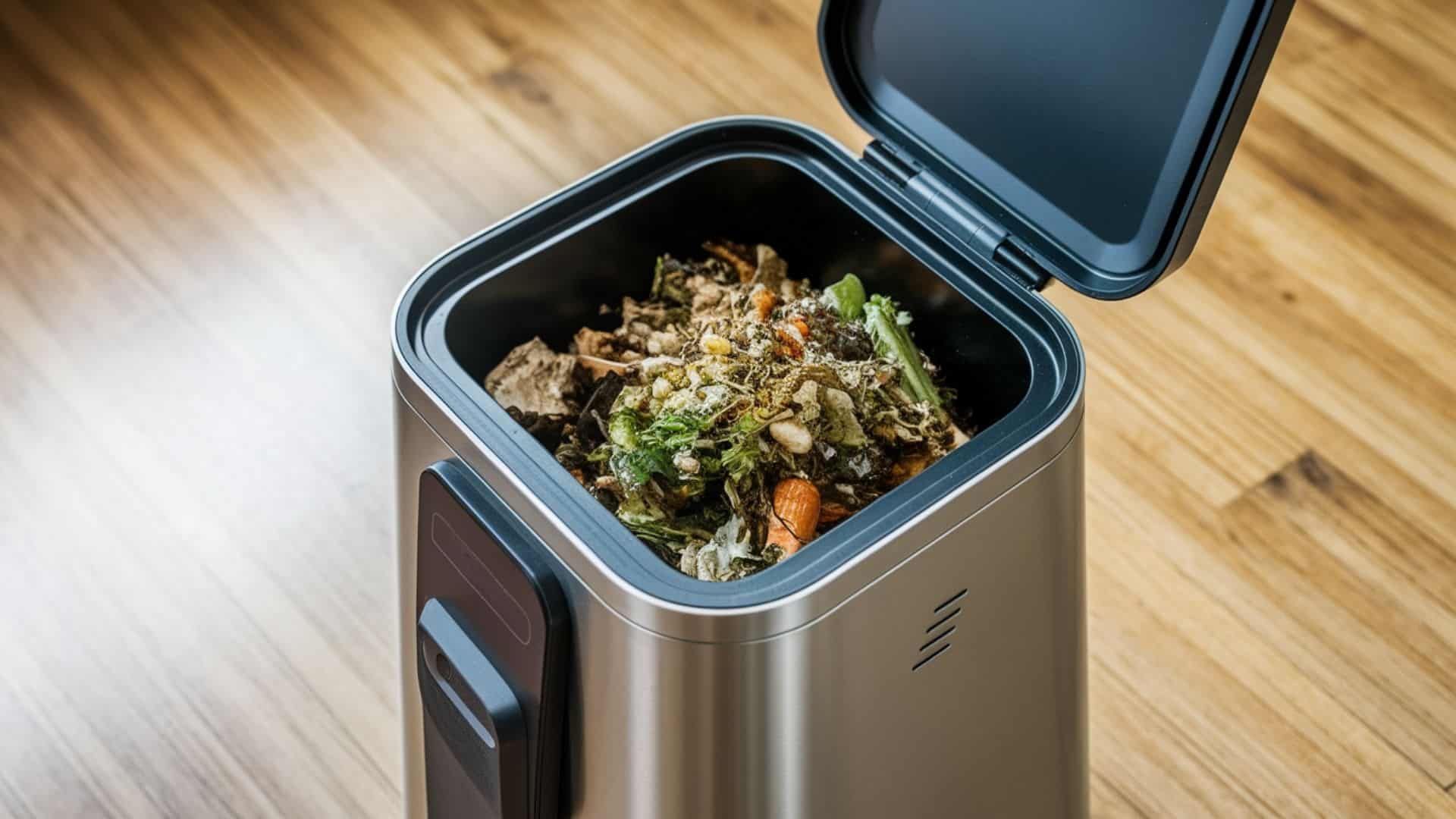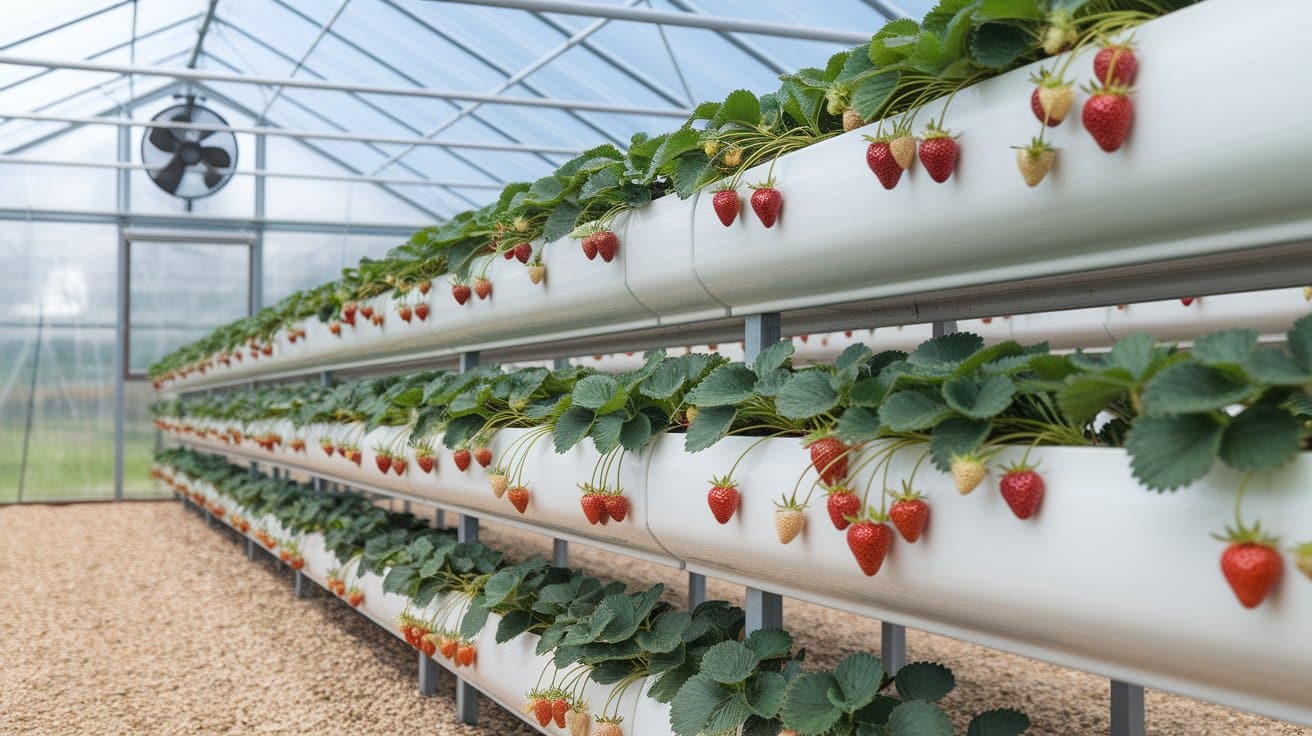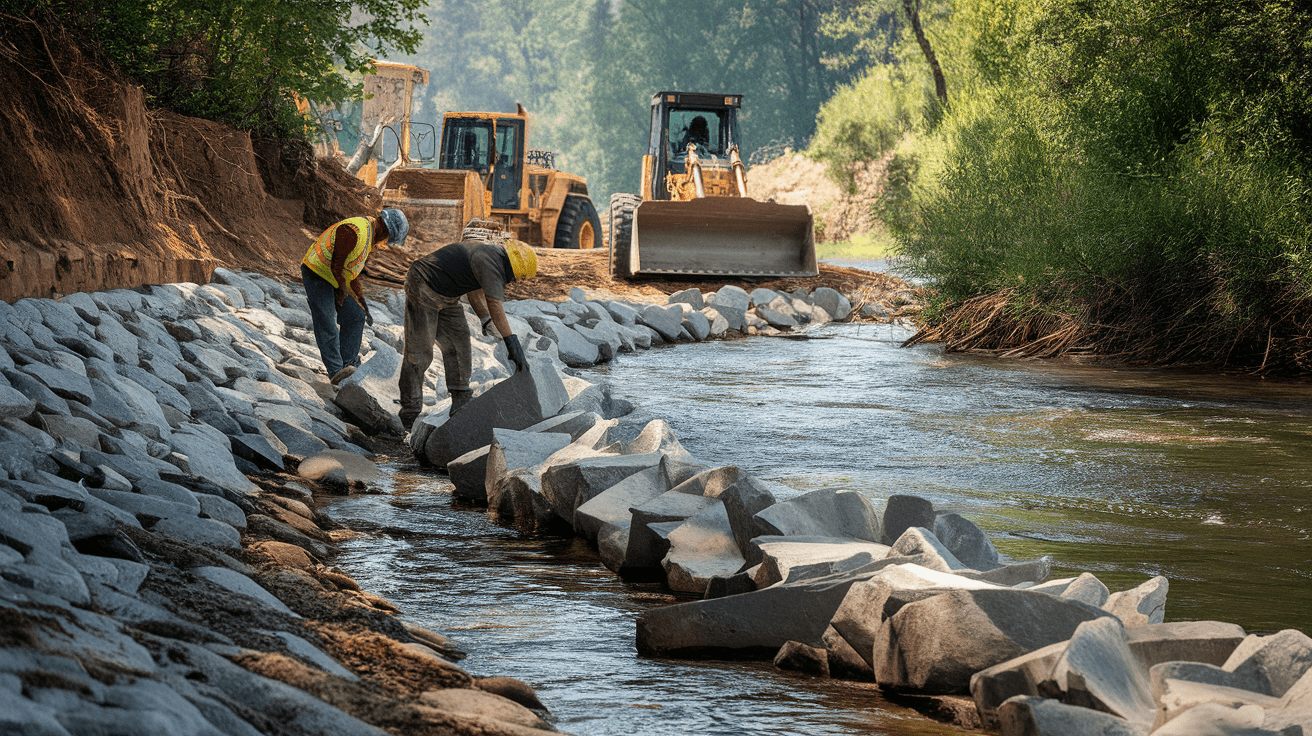Electric composters are making their way into more homes as people look for smarter, cleaner ways to handle food waste.
These compact appliances promise fast and odor-free composting, perfect for apartments and small spaces.
As eco-friendly living becomes a bigger part of daily life, the electric composter is quickly turning into a favorite household helper.
This blog covers what an electric composter is, how it works, the main pros and cons, how it stacks up against traditional composting, and if it’s a good fit for your home or not.
What is an Electric Composter?
An electric composter is a handy kitchen appliance that converts food scraps into a soil-like material using controlled heat, grinding, and airflow.
Unlike outdoor compost piles that take months, these machines deliver results in just a few hours.
They’re compact, simple to use, and perfect for anyone who wants to cut down on food waste without dealing with outdoor bins or unpleasant odors.
How Does an Electric Composter Work?
Electric composters use a combination of heat, movement, and air to turn waste into compost-like material in a short time. The process usually runs through three key stages.
1. Drying Phase
The composter starts by heating the food scraps to remove moisture, shrinking the waste by up to 80 percent.
This step helps prevent bad smells and kills bacteria. Some models even adjust temperature and drying time automatically based on how much waste you add.
2. Grinding and Mixing
After drying, the machine’s blades or paddles break the scraps into tiny particles.
This constant motion lets air move evenly through the waste, helping everything dry and mix well. The smaller pieces mean faster processing and a smoother final result.
3. Cooling and Curing
Once grinding is done, the composter cools the mix, making it safe to handle. The finished material looks like dry soil, often called pre-compost or eco-chips.
You can sprinkle it on garden soil right away or mix it with outdoor compost for better nutrition.
Special thanks to DaisyViews for providing valuable insights in their video, which I referenced while creating this guide.
Many modern models go a step further with extras like:
1. Activated carbon filters to trap odors
2. Moisture and temperature sensors for consistent performance
3. Automatic cleaning cycles to make maintenance easier
All these features work together to create a clean, fast, and low-effort composting experience.
Benefits of Using an Electric Composter
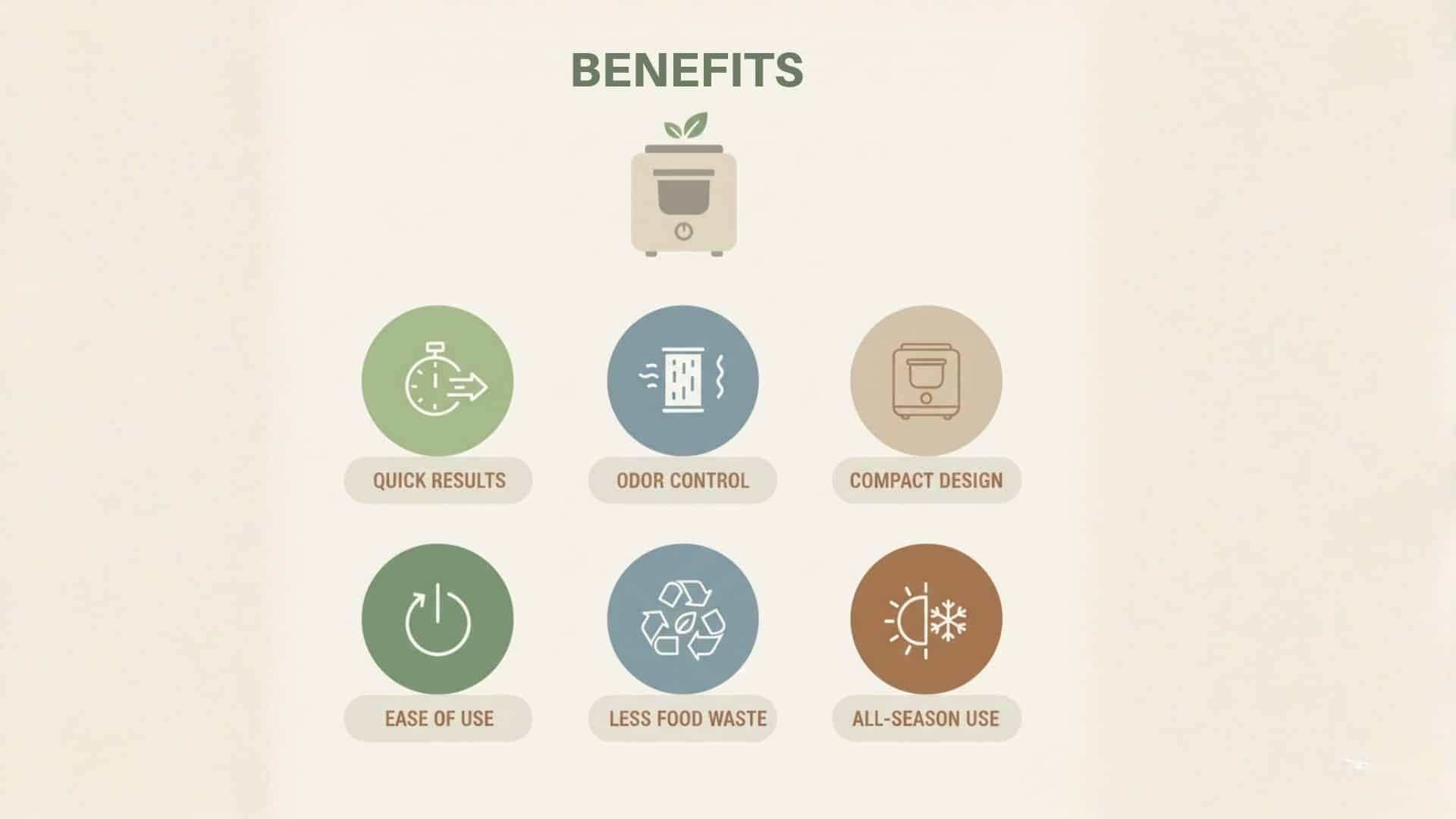
Electric composters take the hassle out of managing kitchen waste.
They make composting quick, clean, and easy enough for anyone to try. Here are the top reasons people love using them.
- Quick Results: Get usable material in hours instead of waiting months for outdoor compost to mature.
- Odor Control: Built-in filters and sealed lids keep unpleasant smells out of your kitchen.
- Compact Design: Small enough for a countertop or corner shelf, ideal for tight spaces or city homes.
- Ease of Use: No need for turning, layering, or adding water; just load, start, and forget.
- Less Food Waste: Reduces what ends up in the trash and helps cut landfill waste and emissions.
- Hygienic Process: Keeps pests away and your kitchen clean, even when handling food waste daily.
- All-Season Composting: Works perfectly no matter the weather, unlike outdoor compost bins that slow down in winter.
Drawbacks of an Electric Composter
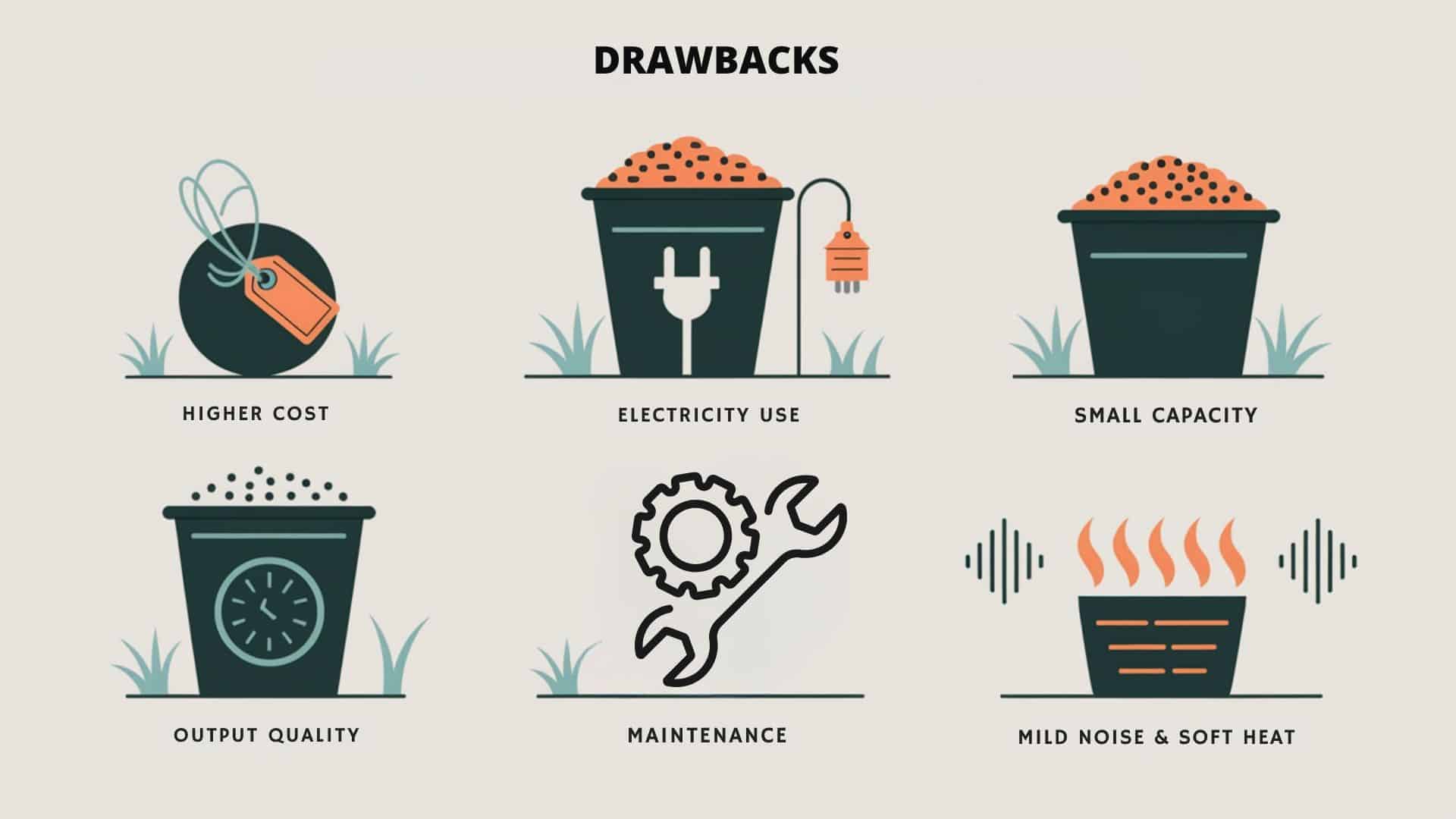
Even with all their perks, electric composters come with a few trade-offs.
Knowing the downsides helps you decide if it’s the right choice for your needs.
- Higher Cost: Quality models can be pricey, which may not work for every budget.
- Electricity Use: These machines need power, which can slightly reduce their environmental edge.
- Small Capacity: Most units handle only a few liters per batch, so large families may find them limiting.
- Output Quality: The result is dry and crumbly, not fully decomposed compost, and might need extra curing.
- Maintenance Needs: Filters and internal parts need occasional cleaning or replacement.
- Mild Noise and Heat: Some machines give off light warmth or sound during operation, though it’s usually minimal.
Electric Composter vs. Traditional Composting
Choosing between an electric composter and a traditional compost system often comes down to convenience versus compost quality.
Both methods recycle food waste effectively, but their processes, effort, and results differ significantly.
| Feature | Electric Composter | Traditional Composting |
|---|---|---|
| Time Required | A few hours | 2–6 months |
| Effort Needed | Low (automatic) | High (requires turning and layering) |
| Odor and Pests | Minimal | Possible if unmanaged |
| Cost | High initial cost | Low or free |
| Compost Quality | Fast but less nutrient-dense | Rich and biologically active |
Traditional composting creates more nutrient-rich compost, but it takes patience and space. Electric composters, on the other hand, are built for convenience.
The better option depends on your lifestyle, available space, and how involved you want to be in the process.
Conclusion
Electric composters bring a modern, mess-free twist to traditional composting.
Compact and efficient, they make composting possible even in small apartments or urban homes where outdoor setups aren’t practical.
Although they don’t produce the same nutrient-rich compost as natural piles, their convenience and speed make them an excellent option for cutting food waste and keeping kitchens clean.
For anyone looking to make composting simpler and more efficient, an electric composter offers a practical and rewarding solution.
If you found this helpful, share it with others who are considering an electric composter or planning to start indoor composting.
Frequently Asked Questions
Can Electric Composters Handle Meat and Dairy Waste?
Most models can process small amounts of meat and dairy, but it’s best to check the manufacturer’s guidelines to prevent odors or machine damage.
Can Electric Composters Run Overnight or Unattended?
Yes, most are designed to operate safely overnight with automatic shut-off features once the composting cycle is complete.
Do Electric Composters Require Special Additives?
Some units recommend using composting pellets or carbon filters to control odor and enhance breakdown, but many function well without additional products.

